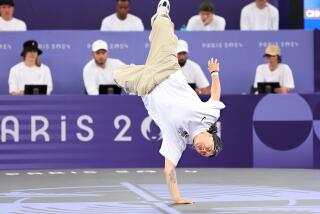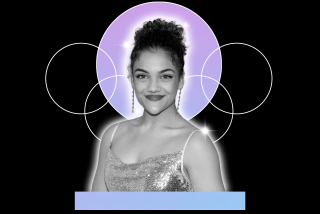Kerrigan Moves to Top, While Harding Falters
- Share via
HAMAR, Norway — While a triumphant Nancy Kerrigan stood at center ice, taking her bows and watching bouquets of roses descend from the crowd around her, Tonya Harding watched stone-faced from behind the window of a private box inside the Olympic Amphitheatre and applauded her rival.
Although the two U.S. figure skaters could hardly be more different, they have shared the same dream. But in that moment, it was clear that both knew that the Olympic gold medal remains within the grasp of only one of them.
After seven weeks of questions about her physical and psychological well-being, Kerrigan, 24, of Stoneham, Mass., provided answers Wednesday night by skating like a champion. If she does it again Friday night, she will become one.
Skating almost flawlessly to the romantic “Desperate Love,” Kerrigan, wearing an elegant white dress with black chiffon sleeves, won first-place marks from seven of nine judges in the technical program. Harding, wearing a flashy red dress, committed one major error and skated unevenly for the remainder of the two minutes, 40 seconds she was on the ice to finish in 10th place, virtually out of medal contention.
For those who have been exhausted by the Super Bowl-like hype surrounding the women’s figure skating competition, Harding’s music, however, might have seemed the most appropriate. She skated to the score from the movie “Much Ado About Nothing.”
Ever since Kerrigan was attacked during the national championships in Detroit on Jan. 6, and Harding was implicated by her ex-husband and other alleged co-conspirators in the plot, their confrontation here has become the most anticipated event of the Winter Olympics, obscuring almost all of the other 1,900 athletes from 66 countries.
Among them are some outstanding female figure skaters, such as Ukraine’s Oksana Baiul and France’s Surya Bonaly, who are second and third, respectively, behind Kerrigan entering Friday night’s freestyle program.
If one of those three women wins that phase of the competition, which accounts for two-thirds of the final score, the gold medal will be hers.
That is the same position they were in after the technical program of the 1993 World Championships in Prague, Czech Republic.
Baiul, who was 15, became the youngest world champion since Norway’s Sonja Henie in 1927, and Bonaly finished second after Kerrigan collapsed in the freestyle program, dropping to fifth.
Kerrigan, who began seeing a sports psychologist to help her perform under pressure when she returned home from Prague, entered this season with renewed confidence, declaring at one point that she should be the favorite for the gold medal.
Her coach, Evy Scotvold, said last week that the attempt in Detroit to derail her made her even more determined.
“I’ve never been so confident and ready to do a freestyle program,” she said Wednesday night.
She also said she had been more concerned about her technical program, but she performed it with only one noticeable mistake. As she was about to begin a spin, she had a bobble that her father, Dan, said was caused by the slight weakness in her right knee lingering from the injuries she sustained in the assault.
“Way to go, baby!” Scotvold yelled to her as she completed her routine, which received a standing ovation from the capacity crowd.
On a scale of 6.0, she received two 5.9s, five 5.8s and two 5.6s for required elements and four 5.9s, two 5.8s, two 5.7s and a 5.6 for presentation.
No one scored higher for required elements, and only the extraordinarily graceful Baiul, portraying the black swan in “Swan Lake,” had better presentation marks with six 5.9s.
“I think Oksana is exquisite,” said 1990 world champion Jill Trenary of the United States. “There is no one who can touch her artistically. But Nancy looked solid as a rock. There was no question she deserved first.”
Paul Wylie, the 1992 silver medalist from the United States, raved about his former training partner.
“Nancy did the best anyone could do after seven weeks of people breathing down her neck, staring at her, taking pictures of her, asking questions of people around her and speculating on what she was having for breakfast,” he said. “I don’t think anyone who can go out there and do that has a fragile psyche.”
Harding, 23, of Portland, Ore., is the one with the reputation for her strength under fire, but she appeared unnerved from the moment she stepped onto the ice Wednesday night. Because she did not earn a berth in last year’s World Championships, she was unseeded here and skated two hours before most of the other contenders.
The only other prominent skater in her position was two-time gold-medalist Katarina Witt of Germany, returning to serious competition at 28 after six years as a professional. Her program did not have the technical difficulty of many of the others, but she performed it superbly and is in sixth place.
Harding skated onto the ice a few minutes after Witt for her warm-up and did not land cleanly on any of her jumps. Twenty-four seconds into her performance, she landed awkwardly on her most difficult jump, a triple lutz, and could not complete the required combination jump, costing her an automatic 0.5-point deduction. Two other lesser errors sent her scores plummeting.
Although there was speculation that the judges would score Harding unfairly because of the bad publicity she has brought to the sport, her presentation marks were respectable, ranging from 5.3 to 5.6. But the judges had no choice but to penalize her for required elements, scoring her from 4.8 to 5.3.
“Her skating seemed to tell the world what she’s been going through,” said Trenary.
* RELATED STORIES: C1, C6, C7
More to Read
Go beyond the scoreboard
Get the latest on L.A.'s teams in the daily Sports Report newsletter.
You may occasionally receive promotional content from the Los Angeles Times.






